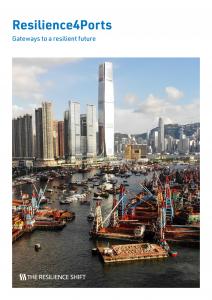
Embrace resilience to advance decarbonisation and address multiple drivers of change says new Resilience Shift report
Multiple drivers of change require a whole-systems approach before low-carbon, resilient PORT transformations can be realised says new Resilience Shift report
The Resilience Shift has launched a new report on the resilience of ports at the end of phase one of their Resilience4Ports project.
Launched in July 2020, the project brought together over 30 organisations from across the ports-value chain to identify the current and future resilience challenges facing the ports industry and the actions needed to realise resilience opportunities and overcome resilience threats.
The new report, 'Resilience4Ports: Gateways to a resilient future’ identifies 36 current and future resilience challenges facing ports and examines the four main drivers of change: decarbonisation, technological change, ports communities and the environment, facing the ports ecosystem., ports communities and the environment, facing the ports ecosystem.
The Resilience4Ports report offers four areas for action in order to enhance the resilience of ports:
1. Learning the lessons from Covid-19 and Brexit on how ports respond to shocks and stresses so the industry can better respond to future crises.
2. Develop guidance for an integrated approach to intersecting port transformations and resilience challenges
3. Promoting port investment that enhances whole system resilience and increases flow of finance to where it is most needed and maximises system-level benefits
4. Convene the ports value chain to understand and shape resilience including port specific resilience appraisal and enhancements.
Ports, as a nexus of multiple systems, can become a leading global example of the transition to a carbon neutral world by mid-century. This approach requires planning and delivering transformation in a holistic manner – one which enhances the resilience of the broad elements of the ports system, recognising future as well as current pressures.
The report finds that embracing resilience can unite action on the main transformations the port industry is currently going through but also create new vulnerabilities. It also found that there is a fragmented nature to both port governance and the approach to the multiple transformative agendas.
To overcome this, a whole-systems approach is needed on resilience, including strengthening relationships with critical port communities as well as cities and connecting infrastructure systems. There is also a need to demonstrate the value of port resilience to unlock the financing needed to achieve it and promote the right types of investments.
Speaking at the launch of the report, Resilience4Ports project founder, Mark Button said:
“Resilience can be the golden threat to unite the multiple transformations the ports industry is currently going through. By enhancing the resilience of ports we can transform multiple systems, including transport, industry, energy and, importantly, the people whose livelihoods dependent on ports”.
“The phase one Resilience4Ports report demonstrates the message on resilience is landing with industry but significant barriers remain preventing action”.
“We will take the insights and calls to action we have heard into phase two, continuing our whole-systems approach to overcome barriers and enhance the resilience of the ports industry”.
“With the COP 26 conference at the end of the year, this is the right time to catalyse the urgent action that needs to be taken by the whole ports-value chain to transform ports into low-carbon, resilient gateways”.
#END#
NOTE TO EDITORS:
During phase one of Resilience4Ports, The Resilience Shift convened over 30 ports organisations, initiatives and actors - from ports finance, operation, from financers to operators and policy makers to shippers – for two workshops identifying the drivers of change and barriers to resilience.
Phase two will see The Resilience Shift work with pre-existing ports initiatives to collaborate on overcoming barriers to resilience and turn the recommendations from phase one into actions.
Interactive report is at 'Resilience4Ports: Gateways to a resilient future'
More information is at Resilience4Ports
Theo Bachrach
The Resilience Shift
+447854505307 ext.
email us here
Visit us on social media:
Facebook
Twitter
LinkedIn
EIN Presswire does not exercise editorial control over third-party content provided, uploaded, published, or distributed by users of EIN Presswire. We are a distributor, not a publisher, of 3rd party content. Such content may contain the views, opinions, statements, offers, and other material of the respective users, suppliers, participants, or authors.


